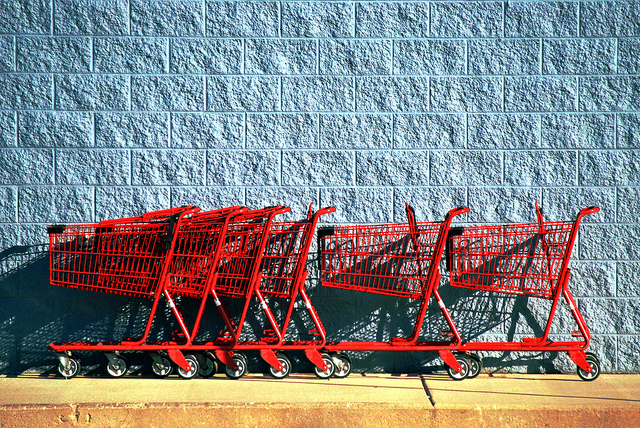Want to know which retailers are naughty and which are nice when it comes to their commitment to cosmetics safety? Who is leading the market trend toward safer products and who’s lagging behind? Which stores consumers should support with their dollars as they shop for non-toxic stocking stuffers this holiday season and which should get coal? The Campaign for Safe Cosmetics just released a report today, Retailer Therapy: Ranking retailers on their commitment to cosmetics safety, putting a spotlight on Walmart, Target, Macy’s, CVS, Walgreens, Costco, Kroger and Whole Foods Market.
Why rank retailers on cosmetics safety?
The $50 billion personal care product industry in the United States is largely unregulated, meaning products you buy at your local retailer—from baby shampoo to lipstick to moisturizers—can contain chemicals linked to cancer, birth defects, infertility and other chronic diseases.
This report provides vital information to consumers, including which retailers screen the products they sell for harmful chemicals; which promote and expand the sale of safer alternatives; and which help customers understand their store’s commitment to health and safety.
How did retailers do?
Taken directly from the Campaign for Safe Cosmetics report:
- Whole Foods Market (Whole Foods) is by far the leader, with proactive policies in place to screen out more than 400 chemicals of concern from its premium products. It offers an extensive range of safer alternatives and communicates its safety commitments and progress clearly to the public.
- At the other end of the spectrum is Macy’s, which stated that government regulations are adequate to address cosmetics safety and that it trusted its vendors to ensure the products the company sells are safe. The company has a very limited selection of safer alternatives, with some of its stores not offering any alternatives at all.
- CVS Caremark (CVS) leads the conventional retailers, having a publicly available policy on its cosmetics safety standards, a wide range of safer alternatives in many of its stores and a policy of phasing out chemicals of concern from its CVS brand baby products.
- Walgreens does not have a publicly available policy that addresses personal care product safety, and safer alternatives are not consistently available in its stores. The company did recently launch its own line of safer products, which to date includes two baby bath products and a few adult shampoos and conditioners. These products are screened to ensure they do not contain certain chemicals of concern.
- Walmart has invested considerably in setting up systems to identify chemicals of concern in products it sells, but has not made progress in translating that knowledge into not selling personal care products that contain potentially harmful chemicals. It also lacks a commitment to do so in the future. Additionally, shoppers found a limited selection of safer alternatives.
- Target carries a range of safer alternatives, but lacks a policy to address chemicals of concern in the full range of personal care products it sells. Target is currently determining what criteria would go into a personal care product standard.
- Costco Wholesale (Costco) has eliminated the use of several chemicals in its signature brand, but has done little else to screen the other cosmetics products it sells. It also does not have a policy to address chemicals of concern in its full range of personal care products and offers limited to no safer alternatives.
- Kroger touts its commitment to selling safer products, but shoppers had mixed experiences with some not finding safer alternatives and one finding a wide range but indicating that this section was a new addition in her local store. Overall the company lacks a comprehensive policy to address personal care product safety.
Our system is broken
Unfortunately, toxins are basically unregulated in this country and can make their way into our homes and our cosmetics without our knowledge.
This needs to change. The law that was meant to protect us is now old and outdated and isn’t doing its job. We still have cans with BPA linings on our shelves. Laundry detergents continue to contain cancer causing chemicals. Nursing pillows and car seats are doused in toxic flame retardants. Toxic chemicals are found in children’s jewelry. Early puberty, childhood cancer, infertility, learning and developmental disabilities are rising at alarming rates. There is no legislation in place to protect us. Companies aren’t required to test the safety of the chemicals in their products. This needs to stop.
What we can do
Shoppers shouldn’t have to be chemists to figure out how to avoid toxic ingredients in cosmetics. The Campaign for Safe Cosmetics shares a few ways we can take action:
- Support smarter laws for safer products.
- Use fewer products with simpler ingredients.
- Read labels for information on product ingredients. Don’t rely on natural or organic claims.
- Find out what’s in your products and find safer alternatives by using Environmental Working Group’s Skin Deep database.
- Shop at retailers that are committed to safer personal care products. In addition to the retailers featured in this report, many natural food stores and coops sell safer products. The Organic Consumers Association compiled a national list of these stores.
What else can we do to fix our broken system? Were you surprised by the findings in the study?
photo credit: Michael W. May via photopin cc

